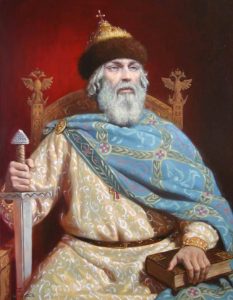(1113 – 1125)

Glorious victory, Vladimir II Monomakh, is so named in honor of his maternal grandfather, the Byzantine Emperor Constantine Monomakh, he was unanimously elected to the throne in Kiev, although he was not senior in the genus.
The Byzantine emperor Alexei Comnen sent him a precious crown and golden barms (omnibus), with which Russian tsars are adorned at the wedding of the kingdom.
While still an appanage prince, Monomakh enjoyed the people’s love. A gentle man, a truthful, God-fearing, brave warrior, he cared for the preservation of peace among the appanage princes, about the establishment of a proper court and order among his people: he established a vir, i.e. fines in criminal cases in favor of the offended, determined the amount of interest on loans and supplemented the “Russian Truth” with new regulations.
Monomakh was one of the best princes of the ancient period of Russian history. The chronicle calls him “brotherly, poverty-stricken and a good sufferer for the Russian land.”
During his reign in Russia there was a silence: quarrels among the princes ceased, the Polovtsians became quiet.
Having reached an advanced age of 72 years, he died, leaving the children with a lesson, which he advises them to read more often. This teaching testifies to his enlightened mind. From Monomakh’s advice, the following are noteworthy: do not break vows; not to kill either the right or the guilty; do not command to kill.